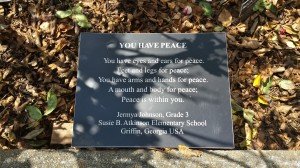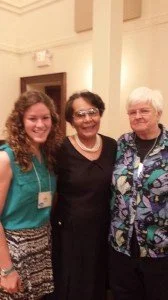So, for all of my Transy friends, you’ll notice that I stole our wonderful slogan, “Question Everything, Accomplish Anything.” For everyone else, the title is an indication for what I’m going to try to portray in this blog. It was immediately obvious that my peace intern summer was going to lead to a lot of questions. It is a summer of asking questions and being asked questions, and I learned really quickly that very rarely do I know the answer to anything. However, sticking to my liberal arts core (insert shameless Transy is awesome note here), I am quite okay with all this questioning happening around me. It is a sign of my growth, but more importantly it is a sign that the campers I encounter are growing as well. Questions are important because a journey isn’t a journey if you know where you are ending up. A question is a beginning for a walk down a path that may only lead to more questions, but don’t fret, there is a purpose in all of this. If we are asking questions, it means we are engaged, and wanting to understand the world. On that note, if we want to find peace and justice in the world, our journey is going to have start with a question or questions. Often times, the questions start with “why”, “how”, or “what”. However, going home to camp at WaKon’Da’Ho, a new question was asked that I want you to think about. “Is world peace even possible?”
Let me first say, I was nervous about going home during my peace intern summer. I had become comfortable being uncomfortable, and I knew going home would shake all this up. I was also worried that having grown up at WKDH would impede on my abilities to establish myself in a new role. My worries should have never been worries and as always, I had an unbelievable week with some of my closest and truest friends in which I continued my spiritual journey and my work as a peace intern continued to challenge my thoughts on the world. WKDH has always had the ability to challenge me and this week, even in a new role, was no different.
The question “is world peace even possible?” came up in one of my meetings with a small group doing my workshop. I asked the campers to write what ever they wanted to on a piece of paper, a question, topic of discussion, or draw a picture. It didn’t even have to be peace and justice related because by this point in the summer, I knew I could turn anything into a peace and justice conversation. This time around, one of the papers had a picture of the world with people standing around it holding hands. I held up the image and asked the campers what it represented to them, and the answers flowed – “world peace,” “unity,” and ‘”love.” Then, the question, “is world peace even possible?”
I wasn’t expecting the question, but I was instantly excited to see where this conversation was going to go. Instead of me answering, I posed the question to the group, and all of them said NO. I sat for a second a bit perplexed, gathered my thoughts, laughed, and jumped in. The initial question opened up many others and attempts to understand what world peace even means. In the idealistic way that we define it today, I agreed with the campers, no world peace is not possible, but as I made it clear to the campers, I wouldn’t be doing this work this summer if I didn’t think peace was possible, we just might need to redefine it a little, or ask more questions about what peace looks like.
Is it the absence of conflict in the world? Or, is it more about a world in which we recognize the fact that we live in community together in which we naturally disagree, but understand that we still have a responsibility to one another? Does this mean that our conscious effort is central to peace? These questions naturally lead to more questions. Doesn’t world peace look differently for different people? For example, an American view for world peace may be entirely different than a Palestinian living in the West Bank or Gaza. Or, what about those in the world who are starving, suffering from disease, discrimination, or fear of being shot every time they walk out the door? Wouldn’t world peace look different for them than for me where I have never felt the sensation of being truly hungry?
This question started a journey for us that day and it was amazing. Now, I want you to join us. These questions may not have answers right now, but they are a starting point and we have to start somewhere. A question ignites a spark and a spark leads to fire, which in this case would mean action. Peace will never be achieved if we don’t talk about what peace means because we can’t accomplish what we don’t understand. Transy is right; to accomplish something, it often times has to start with a question. At camps all summer the questions are being asked and the journey’s are beginning. We can’t have hope without endeavor and I have hope because these kids, beginning by questioning everything are truly going to accomplish anything.
Peace,
Daniel



